McPixel, released to much fanfare in 2012, is the first official release by SOS, the one-man indie studio brainchild of Mikolaj Kaminski. It is far from his first game: in the preceding two years Kaminski developed projects such as Attack of the Heavenly Bats, an incisive expose of the corporate collusion between American baseball clubs and the Christian Right, the avant-garde Chess Without Turns and Frolicking Furballs Safari Resort, a maudlin epiphany for the tragic voxel. But it is McPixel that has taken the world by storm, as a random and non-partisan selection of comments from the game’s Steam Community Hub ably illustrates:
I’m pretty pissed. Why charge someone for this… thing?
Congrats on being the first greenlit game. *slow clap*
Is McPixel too stupid for you to enjoy? Want to complete the game without too much effort? This simple walkthrough will guide you through all the levels, pointing out exactly what you have to do in order to prevent all those bombs from going off.
This outpouring of praise and enthusiasm from critics and fans alike is down to one thing: the immense textual richness of McPixel. It is a critic’s wonderland, replete with more allusion, symbolism and social commentary than the entire output of Electronic Arts between 1867 and 2070.
To demonstrate this I will draw out five vignettes from the videogame McPixel and execute a close reading of each, before drawing together common threads into a conclusion about what McPixel means, and what McPixel the videogame means for the future of the videogames industry.
These five vignettes will be the King and the Fool, the Office, the Space Shuttle, the Belly of a Whale and A Woman Possessed. Readers unfamiliar with the videogame McPixel should note that these five vignettes constitute only five per cent of the hundred levels in total, and have been chosen in part because I am fond of them, and in part because they best illustrate the conclusions I have drawn from McPixel.
The King and the Fool
This scene is set in a medieval throne room although in truth it could be situated anywhere, as the cast featured here are timeless archetypes.
Firstly there is the King, a timeless symbol of wisdom and age. These venerable feudal ur-lords, purportedly chosen by God in Heaven to rule, are also great symbols of authority, power and wealth, wielding all three with an ostentatiousness that is lost today.
Secondly there is the Fool, a similarly eternal figure. Rather than symbolising austere qualities, the Fool stands for youth, naivete and merriment. The Fool thumbs his nose at all and sundry and says what no other can, for humour can de-barb even the most vicious tongue.
There is, of course, also the protagonist McPixel. McPixel is a figure who stands outside the historical and fictional frameworks that constitute these vignettes – he is more of a travelling hero akin to Moorcock’s Elric or the BBC’s Doctor Who – but his peerless competence and parodic attitude see him simultaneously embody facets of both archetypes.
At this point it is worth noting for the uninitiated that McPixel does not bind players to a single outcome; they may choose to interact with these scenes as they see fit. However, recalling works like Groundhog Day and the X-Files episode Monday, McPixel does not permit ‘progress’ until the ‘correct’ outcome is determined and the situation (always explosive, and generally marked symbolically by the timed detonation of a device) is ‘defused’. It is this that ultimately affords McPixel his hero status, and allows – through repetition and variation – the themes of each vignette to emerge.
The events that do – or can, or could, constrained as they are within the tension of quantum probability and narrative flux – transpire in this vignette demonstrate how time makes fools of us all. As the timer inexorably ticks down many common outcomes involve objects falling onto the King archetype and rendering him absurd. The Fool, of course, escapes unscathed, already being a figure of absurdity. McPixel himself even demonstrates this through the medium of putting his underpants on his head and dancing.
Beneath it all lurks the existential terror of knowing that grandeur, wealth, wisdom and power will not save anyone from death.
The Office
This title is my choice and bears no relation to the hit sitcoms The Office, or indeed an actual office, although all three are equally redolent of the thematic beats McPixel strikes upon, and I hope will all be subjected to similar critical analysis in the future.
In contrast to The King and the Fool, the Office does not exhibit the magnificence of august office (forgive the pun), instead focusing keenly upon the banality of everyday working life in such an environment: a banality so deep-rooted it is almost profound.
There are over-arching themes to explore here as well as incidental asides that contribute towards a greater whole. The over-arching themes are explicitly derived from a close reading of both Marx and Engels, focusing on the class injustice that is the extraction of wealth from labour. This is perhaps best articulated by the silent figure standing off to one side: never acting, but always watching. The ‘boss’ – not the boss of McPixel, though perhaps he might like to think of himself so – does not contribute directly towards the fruit of labour, instead acting to subordinate, control and exploit it. The tensions inherent in such inequity have provided immeasurable opportunities throughout history for the angry worker to lash out against those who place a boot upon their necks, and here McPixel is no exception.
But this is not the ‘correct’ outcome, and for all the rage embodied in this vignette there is also a progressive sense of modern humanity; a dialectical desire to move forwards. McPixel’s interactions here can include efforts to inject merriment and joy into this personality-drained world – by photocopying his buttocks on a photocopier – as well as the blossoming of a workplace romance between McPixel and the figure of ‘the boss’: some might call this scabbing, but others will recognise the emergence of the sexual id from beneath ego-driven efforts to suppress it.
Ultimately, however, the day is saved through the use of a pot plant to defuse a bomb. It is, in other words, only the intrusion of the natural world into the artificial can induce progress, in other words liberate both the worker and the boss from the roles capitalism has forced upon them.
The Space Shuttle
Has there ever been as rich and iconic a symbol of technological progress as the space shuttle? Aside from the two which blew up, and the fact that the shuttle is considered by many to have been obsolete from the 1970s onwards and was kept around to help prop up the political institution of NASA, it is truly a timeless reminder of how man and his technogical prowess can conquer all.
The shuttle exhibited in McPixel is no exception. Hurtling along at incredible speeds, it represents the progress of mankind into the unknown reaches of space. Stars twinkle, beautiful but distant; pinpricks in the fabric of the firmament that serve as a reminder of the loneliness of the infinite.
It is important to note that McPixel is not actually alone: also aboard the shuttle is the figure of a stereotypical alien lifeform or ‘EBE’. This creature is styled like the ‘gray’ popularised by the delusions of excitable rural Americans, the 1994 videogame UFO: Enemy Unknown and the 1990s poster Take Me To Your Dealer: a bulbous cranium, large and pupilless eyes, long thin limbs and digits and a mysterious aura of mystery. The gray is a recurrent motif throughout the videogame McPixel, appearing in other vignettes such as Jungle Hot Dog Stand.
Throughout the space shuttle vignette the gray is silent, only acting when provoked by the player/McPixel, serving to remind us that, although space is vast and impossibly to codify and catalogue, there may well be other entities out there, watching us, judging us – and suffering for our failures (if the shuttle is not saved by McPixel, he and the alien are both jettisoned into the vacuum of space).
The means to save the day is, here, resolving engine failure: the failures of technology are, as always, traceable back to human error. A perfect immortal machine requires perfect design, perfect manufacturing and perfect use, which is something that can rarely be expected from pathetic creatures of meat and bone. McPixel, however, resolves the situation through cunning metaphor. Alcohol, a creation of early human innovation and retained through the ages as – among other things – a means of lubricating social interaction, facilitating procreation and staving off boredom, is converted into urine, a base byproduct of human existence. These symbolise what drives mankind and what he leaves behind; whatever technology man creates, some things will always be with us.
In the Belly of a Whale
In this vignette two classic tales collide with the epic story of McPixel: Moby Dick and Pinocchio.
The figure of Captain Ahab, a brave man driven to self-destruction through his pursuit of the white whale, has here reached the conclusion Moby Dick shied away from. Ahab has joined Pinocchio in the belly of a whale. The wooden puppet who desired to be a real boy has, meanwhile, seen his adventure culminate in the multiversal fantasy of McPixel: a bomb also lies in the great mammal’s gullet.
In the Belly of a Whale is chiefly of interest because it makes explicit what many other vignettes demonstrate through more subtle allusion: the extensive depth and breadth of the videogame. It dabbles in many other fictions, drawing from them as it sees fit to stitch a fabric of greater complexity than any traditional work in the novel form. This literary fusion can be seen even in small details within this vignette; one of Ahab’s hands, here replaced by a hook, recalls the figure of Captain Hook from Peter Pan – another classic children’s tale which, like Pinocchio, is concerned with the coming of age voyage.
McPixel himself, of course, need not come of age. As we have already established he is timeless and, indeed, ageless. His adventures are driven not by childish innocence, or self-destructive pursuit of a selfish goal like Captain Ahab, but by a deep need to bring balance and order to the world by ‘saving the day’. In this instance this also means saving the life of the gentle creature whose stomach the vignette is set within.
A Woman Possessed
A Woman Possessed stands out among many vignettes within McPixel in that it is chiefly concerned with social justice and the perversion of justice exhibited by traditional structures of authority. As the scene opens we see a priest wielding a bible above his head, froth flying from his mouth as he denounces the woman who stands before him.
The woman herself is placid and non-responsive; like so many members of societies both historical and present, she has been socialised into a dull acceptance of her social ‘place’ and the treatment this involves. The priest, meanwhile, symbolises the simultaneous contempt for and fear of womanhood exhibited by so many religious institutions, in particular the Catholic church with its assaults on reproductive rights and historical tendency to associate the ‘other’, particularly femininity, with demons.
One outcome of this scene sees McPixel literally defrock the priest (again demonstrating his ready contempt for authority figures). The priest, once robbed of his garments, is revealed in all his hypocrisy, outfitted as he is in women’s lingerie – symbolic of the repression that results from the socialisation he too has been subjected to as both a man and a man of the cloth.
Other outcomes include the woman being turned into a frog – a neat inversion of the traditional fairy tale motif – and her literal possession by tentacular demons. The latter might be read as either actualising what the priest purports to fear or her coming into her own as she is liberated from both her socialisation and the strictures of a misogynistic society – McPixel is not afraid, at times, to inject ambiguity and allow readers to draw their own conclusions.
Conclusion
I hope that the above breakdown of the five vignettes I have carefully selected goes some way toward demonstrating my initial assertion: that McPixel is a fertile source of opportunities for analytical criticism and close reading. I hope that others follow in my footsteps and explore more of Kaminski’s ideas and commentary.
I would like to take one step further and suggest a few broad, initial conclusions, although I would include a disclaimer that the range of scenarios presented by McPixel does allow extensive opportunity for apparent contradiction. I hope that, as a greater body of critical work is assembled, we will begin to see these contradictions teased out, allowing for a greater and more comprehensive understanding to be developed.
This notwithstanding, I feel confident in asserting that McPixel is, at heart, concerned with the competence of mankind. This is seen at its best in McPixel’s irrepressible cheerfulness and courage, no matter what a scenario throws at him or what the ‘failed’ outcomes of various vignettes might be. It should be noted, however, that McPixel is deep down just a man: in the bonus round for Chapter 4 we are affored a rare but disturbing insight into his mind. The pressure of his role in life has fractured his sanity, leading him to perpetually surround himself with danger – even at home.
There is, further, a possibly non-canonical implication that McPixel is in fact the agent responsible for engineering the dangerous scenarios which he defuses – although it is quite possible that this is a false flag operation by parties unknown. This is lent credence by the tendency of McPixel to support progressive causes and to parody, mock or even tear down traditional authority structures.
Ultimately, of course, McPixel possesses little internal logic, the game and protagonist sharing an anarchic and irreverent approach. Similarly the game’s creator is known to dress as McPixel for promotional purposes; this intrusion of fiction into reality is a neat mirror of the way reality intrudes into McPixel – and there is much that we can learn from these juxtapositions. This thoughtful yet anarchistic and appropriative/collage approach to narrative and game design marks a turning point in videogame development and, in years to come, it will be McPixel that is remembered as the game which began it all.
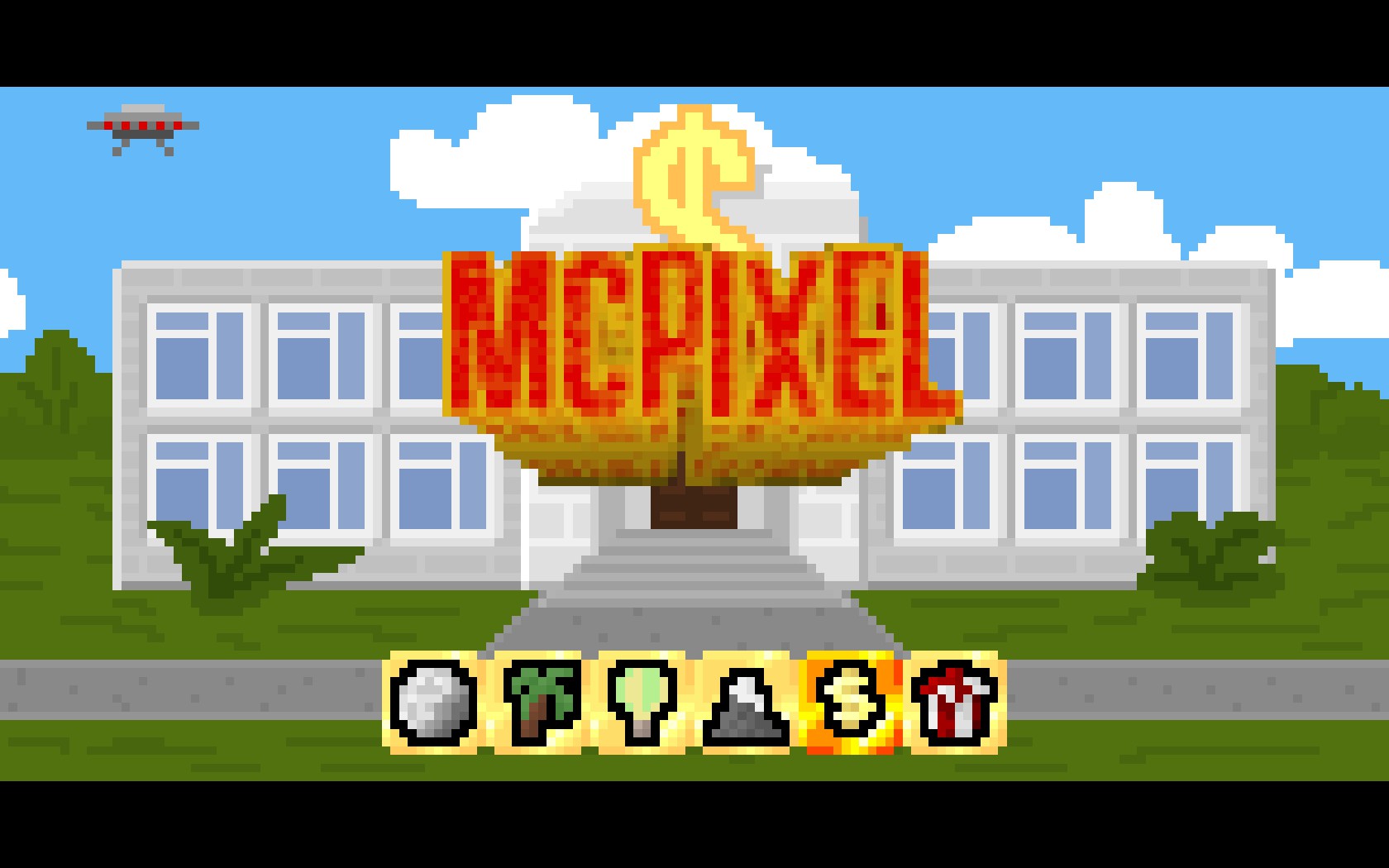
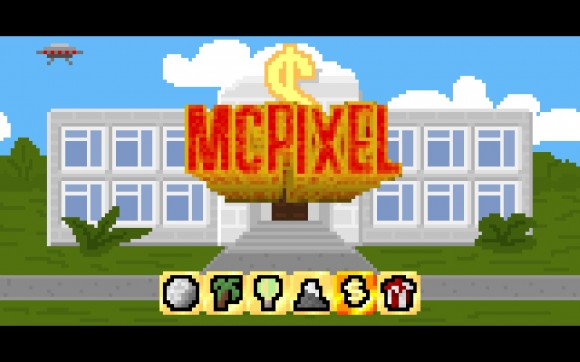
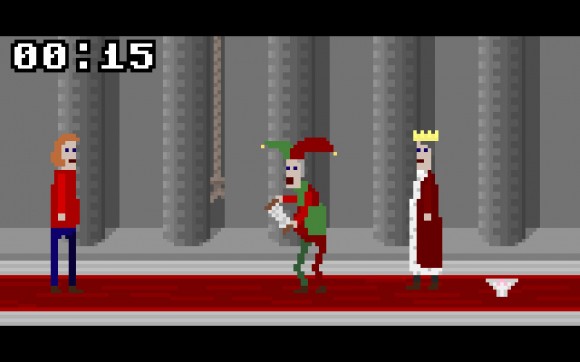
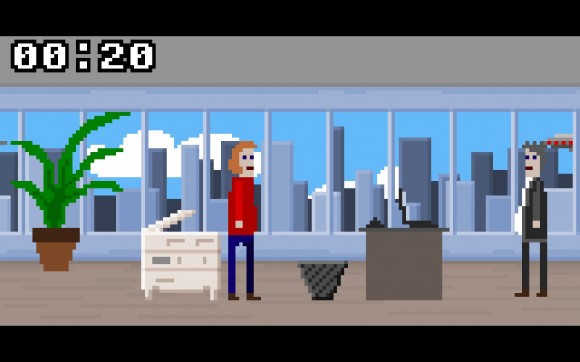
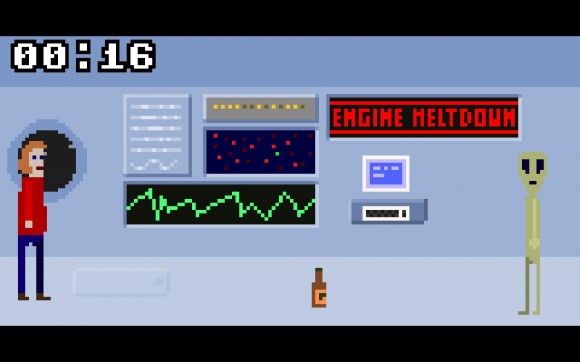
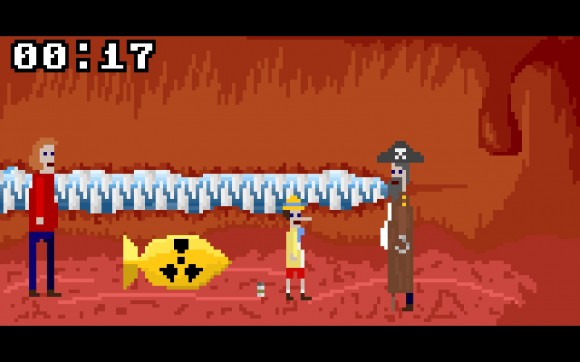
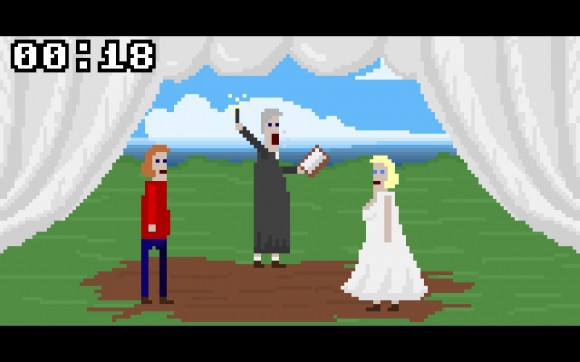
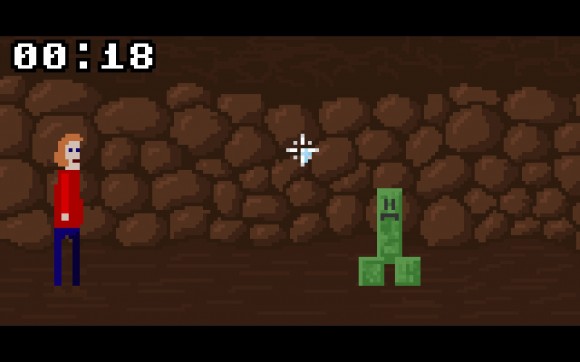
Comments
6 responses to “McPixel: a Deep Textual Analysis”
*tries not to spit drink onto screen*
I do not understand this response to my entirely serious essay. :(
Ludo-Narrative Dissonance.
AMIDOINITRITE
I love it when you talk dirty.
10 gameplays out of 10.
[…] with a game like McPixel (not reviewed on AR but thoroughly enjoyed here) the challenge lies less in challenge than in experience. It is, simply put, rather fun to burn […]